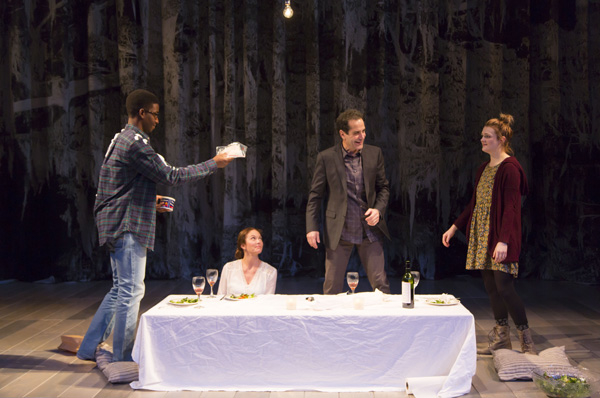The Mystery of Love & Sex

(© T. Charles Erickson)
Don't expect an Agatha Christie-style reveal at the end of Bathsheba Doran's The Mystery of Love & Sex. That caper will remain unsolved long after this show ends its run at Lincoln Center Theater's Mitzi E. Newhouse. Under the sensitive and precise direction of Sam Gold, however, Doran's occasionally dramatic comedy might prod you into some conclusions of your own — provided you don't tune out first.
Twenty-one-year-olds Charlotte (Gayle Rankin) and Jonny (Mamoudou Athie) are so close, they're "beyond dating," or so Charlotte claims. They've never had sex, but they've been best friends since they were nine. They've summoned Charlotte's parents, Lucinda (Diane Lane) and Howard (Tony Shalhoub), to their Spartan college dorm for an underwhelming dinner party in an effort to show what good adults they're becoming. "I like it, it's Bohemian," Georgia peach Lucinda offers when surveying the bed sheet playing the part of a tablecloth. Acerbic Jewish crime novelist Howard is less conciliatory, lobbing backhanded compliments about the meal of salad and unbuttered French bread. He's come armed with the phone number of a hot young TV star in hopes that Charlotte will give up her notion of a life with Jonny. Charlotte thinks her father's aversion to Jonny might be because he's black and a Baptist. She won't be separated from him, even after they both start sleeping with other people.
Athie and Rankin brilliantly capture the essence of this extraordinary (and extraordinarily frustrating) relationship. Rankin boldly plays the messy emotional sponge, yanking off all her clothes in a moment of inebriated passion and wringing out her anxiety all over the room. As Jonny, Athie is reserved and inscrutable — the exact opposite of his BFF. It's almost as if he has something to hide. You get a very clear sense of the dynamic of their relationship.
Similarly, Shalhoub and Lane offer a compellingly realistic portrait of a middle-aged couple of former rebels who bucked their families' wishes when marrying, only to turn around and throw a wet blanket on their daughter's star-crossed romance. Fools rush in, and they know from experience. Shalhoub plays a neurotic and clever New York writer (obviously, he's the funniest one onstage). Lane gives us a latter-day Southern belle with a weed habit and a tendency to over-share (her character seems like she would be the most fun at a party). We never question that confrontational, alcoholic Charlotte is their daughter.
Doran is very good at crafting realistic and specific relationships. Unfortunately, the drawn-out way she achieves this often comes at the expense of the plot's forward motion. As a remedy, Gold has stripped the production down to the bare essentials. Andrew Lieberman's minimal set (a few chairs and tables) creates different spaces and times with only minor rearrangement and dressing. Jane Cox lights the faux-wood floor and upstage curtains in just the right way so we are fully convinced we are in a cramped dorm room at 3am or a sprawling veranda at high noon, as the scene requires. Gold seems to be trying to frame this story as the quintessential tale of the generational divide between baby boomers and their millennial children.
There is ample evidence of that fraught relationship in Doran's charming but shaggy script. "It's so hard to know when to be mother and daughter and when to be friends," Lucinda remarks to Charlotte before an overlong heart-to-heart. Howard becomes increasingly apoplectic when Jonny coldly enumerates the literary microaggressions against sexual and racial minorities strewn throughout his novels. The parents lecture the kids about stable relationships and responsible substance use, but they don't seem to be doing any better on their end. This story overflows with the foibles of the two most remarked upon (and arguably hated) American generations.
Unfortunately, it's easy to lose this story in the labyrinth of Doran's script, which feels at odds with Gold's thrifty direction. This play could easily be trimmed to one act without losing any of its substance. In fact, it might even pack more of a dramatic punch. As it is, our minds tend to wander along with Doran's prose. There may be a few clues to unlocking The Mystery of Love & Sex, but they are hidden in a sea of red herrings.










